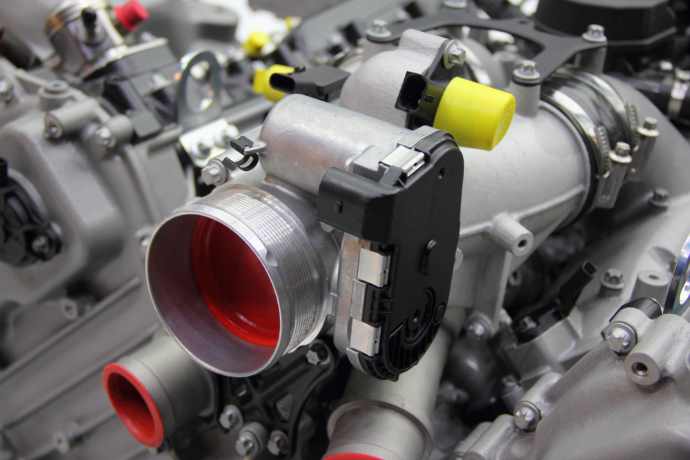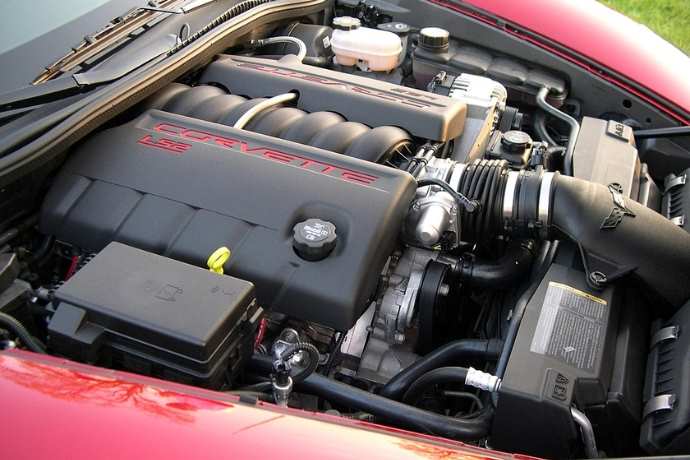GM introduced the 6.0L engine in 1999, also known as the Vortec 6000. In 2019, the 6.2L Vortec engine replaced the 6.0L Vortec.
The GM 6.0L small-block V8 engine is well known for its excellent power output. The engine has an excellent lifespan, and a properly maintained GM 6.0L engine can last up to 300,000 miles.
GM 6.0-liter engine has experienced some common issues over its 20-year journey.
I have discussed here six common GM 6.0 engine problems, along with their symptoms and solutions.
In addition, I have provided some tips on how to minimize or avoid the 6.0L engine issues.
Let’s take a quick look at six common GM 6.0 engine problems: water pump failure, faulty throttle body sensor, engine knocking, poor gas mileage, exhaust manifold leaks, and active fuel management system failure.
1. Water Pump Failure

Water pump failure is common with GM 6.0L engines after 150,000 miles.
The water pump is an important vehicle component, and its failure causes engine overheating.
In the end, a water pump failure damages the engine.
Symptoms
- Engine overheating
- Coolant leaks
- Unusual noises
- Steam emitting from the engine compartment
Solutions for Water Pump Failure
First, check the coolant level and quality when you notice water pump failure symptoms.
Contaminated coolant, leading to water pump failure.
If the coolant is contaminated, replace it with fresh coolant properly.
If the water pump fails or you’ve driven more than 150,000 miles on your GM 6.0L Vortec, it’s time to replace it.
The 6.0-liter water pump replacement cost is approximately $330, including labor charges.
Tips for Preventing the Water Pump Failure
- Change the coolant regularly
- Inspect the water pump regularly
- Avoid overloading
- Ensure a professional inspection once a year.
Read also: 5.3 liter chevy engine problems.
2. Throttle Position Sensor Failure

The throttle position sensor controls airflow into the engine.
The TPS sensor is mounted on the throttle body and monitors the throttle position (open or closed).
The TPS sensor transmits this information to the ECU, which helps determine the amount of fuel sprayed into the engine.
The TPS sensor has a high failure rate on the GM 6.0L engine.
Faulty TPS disrupts the engine combustion system’s air-fuel ratio, leading to various engine problems.
Symptoms
- Acceleration issues
- Reduced engine performance
- Rough idling
- Check engine light comes on
- P0121 or P0122 error code
Solution
When you notice TPS sensor failure symptoms, inspect the sensor properly.
Sometimes dirt and other debris clog the sensor.
In this case, routine cleaning can solve the issue.
In another case, replacement is the most suitable option if the sensor is faulty.
Watch the video below to learn how to replace the TPS sensor on a 6.0L engine yourself:
Tips for Avoiding Throttle Position Sensor Failure
- Keep the throttle body clean
- Avoid idling the engine for a long time
- Avoid driving in dirty or dusty conditions
3. Engine Knocking Issue
Engine knock is a common problem with some Vortec engines, especially in cold weather.
It is a common and major problem that leads to major engine damage.
Causes of the Knocking Issue in the 6.0L Engine are
- Defective knock sensor
- Low level of engine oil
- Incorrect spark plug gaps
- Worn bearing
Symptoms of Knock Sensor Failure
- Knocking noise from the engine
- Check engine light
- Rough idling
- Engine misfires
- Overheating
Solution
First, check the knocking sensor.
If the sensor is malfunctioning, replace it with a new one.
The 6.0L engine knock sensor replacement costs approximately $80 to $100.
Other steps include checking the engine oil level and using the correct octane fuel.
Inspect the spark plugs and timing belts because they are major components that cause engine knocking.
Replace the 6.0L engine’s spark plugs when the engine reaches 30,000 miles.
Tips for Avoiding Engine Knocking Problems
- Avoid overloading.
- Keep the engine compartment clean.
- Use the best quality engine oil according to manufacturer specifications.
4. Poor Gas Mileage

GM 6.0L Vortec engine also suffers from gas mileage issues.
According to many drivers, their vehicles cannot go above 17 mpg.
Solution
Bad driving habits are a big reason for poor gas mileage.
So, try to drive smoothly for better gas mileage.
Also, misfires, overloading, and internal engine problems are the most common causes of poor gas mileage.
So, inspect the vehicle’s engine properly to determine the cause of poor gas mileage.
Or, take your vehicle to a repair shop for proper treatment.
Use the best-quality engine oil and ensure the oil meets the required level to get the engine’s best performance.
5. Exhaust Manifold Leaks
Exhaust manifold leaks are common with the 3rd generation 6.0L engine.
Using low-quality bolts while manufacturing is the main reason for this issue.
On the other hand, improper torque is another reason for exhaust manifold leaks.
Symptoms
- Exhaust fumes odor in the vehicle cabin
- Smoke comes out of the hood
- Excessive engine noise
Solution
If you find the leak quickly, you can easily fix it by changing the gasket.
If the leak is minor, you may be able to repair it with sealant.
Sometimes the exhaust manifold is cracked or damaged and needs to be replaced.
Exhaust manifold replacement costs approximately $510 to $620, including labor charges.
Watch this video to learn how to detect exhaust manifold leaks.
6. Active Fuel Management System Failure
General Motors includes an active fuel management (AFM) system in its Vortec 6.0L IV generation models to improve fuel economy.
Under light-load conditions, the system allows V8 or V6 engines to deactivate a portion of the engine’s cylinders to reduce fuel consumption.
However, rather than improving, the system has become a common issue in many vehicles.
Many drivers have reported AFM failure issues in their 6.0L engines, which cause the following issues:
- Reduced fuel economy
- Check engine light illuminates
- Rough engine operation
- Engine wear increased
- Overheating
The issues mentioned are typical symptoms of an active fuel management system failing.
Solution
AFM system failures have been reported on some 6.0L GM vehicles.
If your vehicle has an AFM system failure issue, you can disable the AFM system to prevent other problems caused by it.
Your vehicle’s fuel economy may decrease after disabling the AFM system.
I recommend hiring a professional mechanic to disable the AFM system to avoid further issues.
Final Thoughts
GM’s 6.0-liter engine is much better than its predecessor in terms of problems.
It is a highly reliable and long-lasting engine.
Problems with GM 6.0L engines are relatively easy to fix and cheaper than previous versions.
Always follow the problem-preventive tips mentioned above for a hassle-free driving experience.
Some problems can be solved with simple DIY methods, but I recommend seeking professional assistance for more complicated issues.

